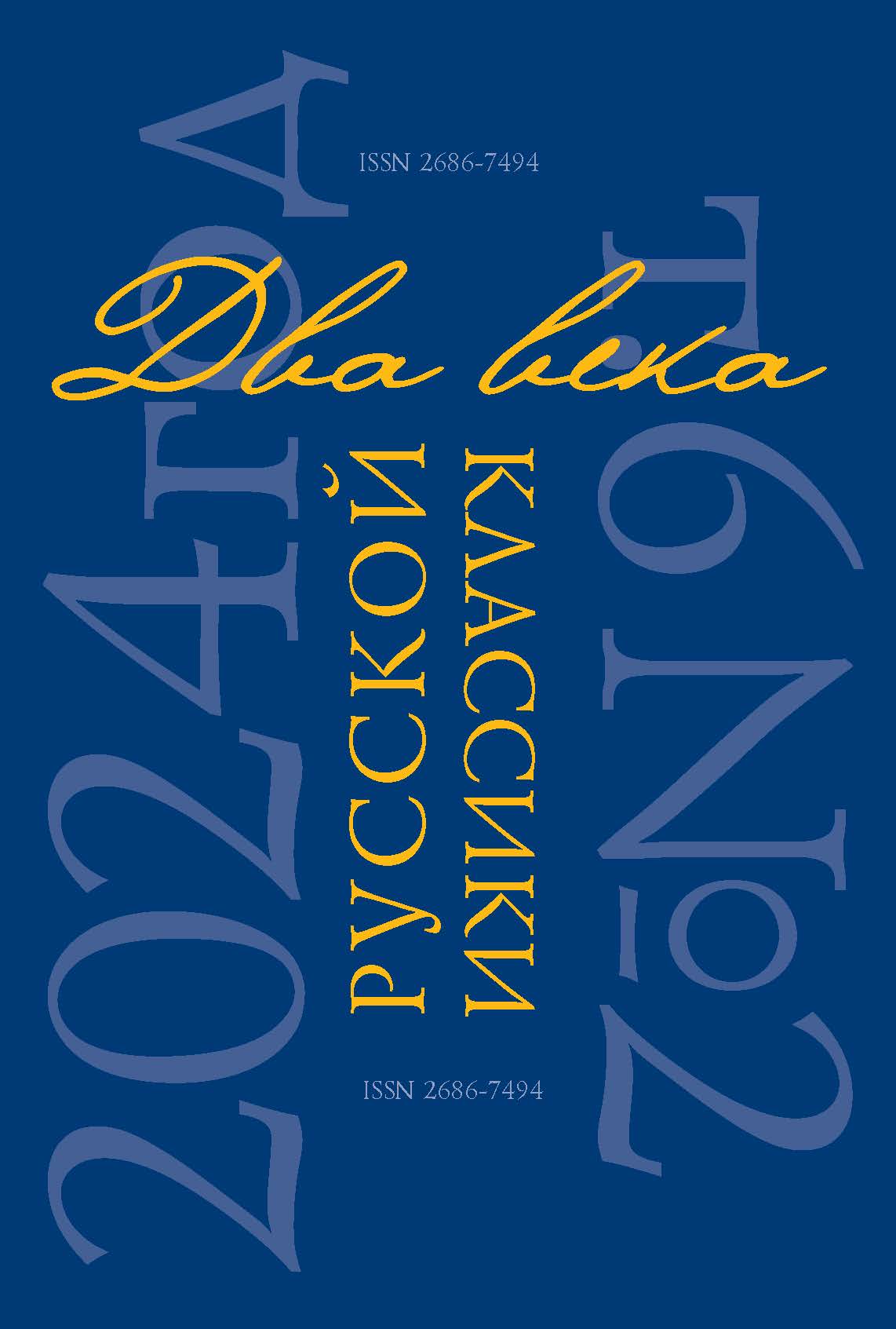Abstract:
The article focuses on felicitous concepts (interpretations of the essence of happiness and the ways to achieve it) that have taken place in the “caucasian” megatext of Russian literature and have shaped the felicitous paradigm. Several works (“Prisoner of the Caucasus” by A. S. Pushkin, “The Hero of Our Time” by M. Yu. Lermontov, “The Cossacks” by L. N. Tolstoy, “Duel” by A. P. Chekhov) are considered as a polytextual complex of palimpsest type, which reflects the system of characters, complexes of motifs and other essential features of previous texts against the background of the common mythopoetic nature. The article examines the role of the Caucasus as a locus, which has the nature of the “other world,” in the creation of felicitous myths. The semantic presupposition of the Caucasus allows to update the corresponding felicitous meta-plot by including the Caucasus locus in the text. The article considers A. P. Chekhov’s short story “Duel” in the context of the felicitous paradigm, formed on “caucasian” substrate. Summing up the results, it can be concluded that the felicitous paradigm in the “Duel” is transformed, so that the search for happiness coincides with the search for “another self.”
References
Arkhireev, M. V. Kavkazskaia voina v russkoi literature 1820–1830-kh godov [The Caucasian War in Russian Literature of 1820–1830s: PhD Dissertation]. Tver’, 2004. 169 p. (In Russ.)
Bocharov, S. G. “ʽSvoboda’ i ‘schast’e’ v poezii Pushkina” [“ʽFreedom’ and ‘Happiness’ in Pushkin’s Poetry”]. Problemy poetiki i istorii literatury [Problems of Poetics and Literary History]. Saransk, Mordovia State University Publ., 1973, pp. 147–163. (In Russ.)
Dviniatin, F. N. “Poeticheskaia traditsiia — topika — intertekstual’nost’” [“Poetical Tradition — Topoi — Intertextuality”]. Intertekstual’nyi analiz: printsipy i granitsy [Intertextual Analysis: Principles and Boundaries]. St. Petersburg, St. Petersburg University Publ., 2018, pp. 80–92. (In Russ.)
Ibatullina, G. M. “ʽA schast’e bylo tak vozmozhno…’: felitsitarnaia tema i ee interpretatsii v russkoi literature” [“ʽAnd Happiness was so Possible…’: Felicitic Theme and its Interpretations in Russian Literature”]. Kormanovskie chteniia: Stat’i i materialy [Korman Readings: Articles and Materials], issue 13. Izhevsk, Udmurt State University Publ., 2014, pp. 69–75. (In Russ.)
Ibatullina, G. M. “Felitsitarnyi mif v povesti L. N. Tolstogo ‘Kazaki’.” [“Felicitary Myth in L. Tolstoy’s Novel ‘The Cossacks’.”]. Slavianskie chteniia: Stat’i i materialy [Slavic Readings: Articles and Materials]. Sterlitamak, Sterlitamak Branch of Bashkir State University Publ., 2019, pp. 31–38. (In Russ.)
Ibatullina, G. M., and G. V. Mishina, and E. A. Rad’, and Iu. A. Staritsyna. “Felitsitarnyi metasiuzhet v russkoi literature XIX veka” [“Felicitary Meta-plot in the 19th Century Russian Literature”]. Sovremennye issledovaniia sotsial’nykh problem, no. 4, 2020, pp. 91–115. https://doi.org/10.12731/2077-1770-2020-4-91-115 (In Russ.)
Ibatullina, G. M., and Iu. A. Staritsyna. “Felitsitarnyi mif v romane I. A. Goncharova ‘Oblomov’.” [“Felicitary Myth in the Novel by I. Goncharov ‘Oblomov’.”]. Filologicheskie nauki. Voprosy teorii i praktiki, no. 5-2 (71), 2017, pp. 16–19. (In Russ.)
Idel’bakova [Migranova], L. Sh. “Schast’e kak geshtal’t felitsitarnoi otsenki v romane ‘Anna Karenina’ L. N. Tolstogo” [“Happinness as a Gestalt of Felicitic Assessment in the Novel ‘Anna Karenina’.”]. Russkii iazyk i metodika ego prepodavaniia: Traditsii i sovremennost’ [Russian Language and Methods of Teaching: Traditions and Modernity]. Tiumen’, University of Tyumen Publ., 2007, pp. 150–153 (In Russ.)
Koshelev, V. A. “Oneginskii ‘mif ’ v proze Chekhova” [“Onegin ‘Myth’ in Chekhov’s Prose”]. Chekhoviana: Chekhov i Pushkin [Chekhoviana: Chekhov and Pushkin]. Moscow, Nauka Publ., 1998, pp. 147–154. (In Russ.)
Mishina, G. V. “Motiv poiska schast’ia v tvorchestve N. A. Nekrasova” [“The Motif of the Search for Happiness in the Work of N. A. Nekrasov”]. Filologicheskie nauki. Voprosy teorii i praktiki, no. 11-2 (65), 2016, pp. 28–30. (In Russ.)
Modebadze, I. I., and T. G. Megrelishvili. “Vospriiatie Kavkaza russkim romanticheskim soznaniem: ot istokov k sovremennosti” [“Russian Romantic Perception of the Caucasus: From Beginnings to Modernity”]. Literatura v dialoge kul’tur 5. Sbornik materialov [Literature in the Dialogue of Cultures 5. Collection of Materials]. Rostov-na-Donu, Nauchno-metodicheskii tsentr “Logos” Publ., 2007, pp. 145–149. (In Russ.)
Molchanova, D. A. “K voprosu o prirode politekstual’nykh kompleksov v literature” [“To Issue of the Nature of Politextual Complexes in Literature”]. Studia Litterarum, vol. 6, no. 3, 2021, pp. 40–55. https://doi.org/10.22455/2500-4247-2021-6-3-40-55 (In Russ.)
Molchanova, D. A. “K voprosu o sootnoshenii kavkazskogo i sibirskogo ‘tekstov’ russkoi literatury” [“On the Question of the Correlation of Caucasian and Siberian ‘Texts’ of Russian Literature”]. Novyi filologicheskii vestnik, no. 1 (60), 2022, pp. 68–76. https://doi.org/10.54770/20729316-2022-1-68 (In Russ.)
Proskurin, O. A. Poeziia Pushkina, ili Podvizhnyi palimpsest [Pushkin’s Poetry or the Moving Palimpsest]. Moscow, Novoe literaturnoe obozrenie Publ., 2001. 462 p. (In Russ.)
Rudakova, S. V., and A. V. Petrov. “Trudnoe schast’e geroev M. Iu. Lermontova (pogonia za schast’em istinno neschastnogo cheloveka)” [“Difficult Happiness of Mikhail Lermontov’s Heroes: The Pursuit of Happiness by a Truly Unhappy Man”]. Vestnik Kemerovskogo gosudarstvennogo universiteta, no. 1, 2022, pp. 73–82. https://doi.org/10.21603/2078-8975-2022-24-1-73-82 (In Russ.)
Shul’zhenko, V. I. “ʽKavkazskii tekst’ russkoi literatury: granitsy opisaniia i paradoksy vospriiatiia” [“ʽThe ‘Caucasian Text’ of Russian Literature: Description Boundaries and Perception Paradoxes”]. Izvestiia dagestanskogo gosudarstvennogo pedagogicheskogo universiteta, vol. 1, no. 1, 2017, pp. 104–108. (In Russ.)
Erkenova, A. Kh. Kontsept Kavkaza v russkoi poezii 20–30-kh gg. XX veka [Concept of the Caucasus in Russian Poetry of the 20s–30s of 20th Century: PhD Thesis, Summary]. Moscow, 2011. 29 p. (In Russ.)
Corrigan, Yuri. “Chekhov and the Divided Self.” The Russian Review, vol. 70, no. 2, April 2011, pp. 272–287. (In English)
Corrigan, John Michael, and Shun-Liang Chao, editors. Romantic Legacies: Transnational and Transdisciplinary Contexts. New York, Routledge, 2019. 336 p. (In English)









